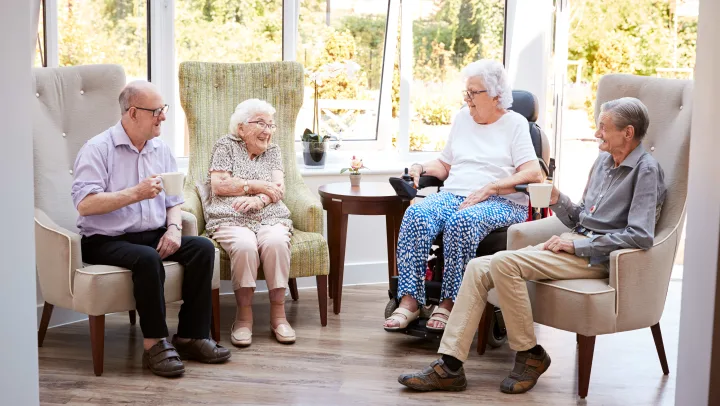Discover luxury Assisted Living facilities with top-notch amenities.
Discover luxury Assisted Living facilities with top-notch amenities.
Blog Article
Finding the Right Assisted Living Service for Tailored Memory Care Programs
The procedure of choosing an appropriate assisted living option for customized memory treatment programs requires a nuanced understanding of specific needs, specifically as they relate to cognitive disabilities such as Alzheimer's and dementia. As we explore these aspects, the question stays: what absolutely constitutes an ideal environment for memory care?
Comprehending Memory Treatment Needs
Understanding the one-of-a-kind memory treatment demands of individuals with cognitive disabilities is important for providing reliable support and boosting quality of life. Cognitive problems, including Alzheimer's illness and various other types of dementia, considerably influence a person's ability to process details, connect, and maintain freedom. As a result, customized strategies are important in resolving these challenges.
Individuals with memory disabilities often experience confusion, mood variations, and disorientation, necessitating a helpful and structured environment. Memory treatment programs must concentrate on producing a risk-free area that encourages social interaction, cognitive interaction, and emotional health. This can be attained with specialized tasks, such as memory games, art treatment, and reminiscence sessions, which promote cognitive stimulation and maintain individual identification.

Evaluating Personnel Certifications
The credentials of team member in memory care programs are critical to supplying high-grade support for people with cognitive disabilities. Examining personnel certifications includes evaluating both educational history and sensible experience in senior citizen care, specifically in memory-related conditions such as Alzheimer's and other types of mental deterioration.
Look for personnel that have relevant accreditations, such as Qualified Mental Deterioration Practitioner (CDP) or specialized training in memory care. These credentials suggest a dedication to understanding the intricacies of cognitive decrease and reliable communication techniques tailored to residents' one-of-a-kind demands. On top of that, inquire regarding continuous training possibilities that personnel participants take part in, as continuous education is vital in an area that advances quickly with new research study and finest methods.
Moreover, assess the staff-to-resident proportion, as this straight impacts the high quality of care. Ultimately, a professional team is paramount in cultivating an atmosphere that boosts the dignity and quality of life for people in memory care.
Relevance of Personalized Treatment Plans
Individualized care strategies play a crucial function in boosting the health of individuals in memory treatment programs. These plans are customized to the unique needs, choices, and capabilities of each homeowner, making sure that care is both appropriate and efficient. By considering variables such as medical background, cognitive function, and personal interests, caretakers can create a detailed approach that promotes self-respect and respect for each and every individual.
The importance of personalized care strategies expands past basic care requirements; they cultivate a complacency and experience, which is essential for people experiencing memory challenges. By dealing with details behavior patterns and psychological feedbacks, caretakers can implement techniques that lower anxiousness and boost total lifestyle.
Furthermore, personalized care plans assist in far better interaction among personnel, household members, and doctor. This collaborative approach makes sure that everyone involved is informed and straightened in their treatment efforts, causing more consistent and effective assistance. Inevitably, a well-structured individualized treatment strategy is necessary in memory care programs, as it not only enhances day-to-day living experiences yet additionally adds to the long-lasting health and joy of homeowners.
Involving Tasks and Programs

Tasks such as art therapy, music sessions, and memory treatment give opportunities for self-expression and cognitive engagement. These deliberate interactions not only assist in protecting cognitive abilities yet likewise offer emotional advantages, minimizing feelings of seclusion and stress and anxiety that often come with amnesia.
Furthermore, organized group tasks can motivate socializing, which is vital for emotional wellness - Assisted Living. Normal involvement in video games, exercise classes, and area trips creates an atmosphere of sociability and support. Tailored programs that think about private passions and histories additionally enhance interaction, making tasks much more meaningful and efficient
Including technology, such as memory games and digital reality experiences, can additionally serve to enhance the day-to-days live of locals, supplying innovative methods to boost cognitive feature. Inevitably, a focus on interesting activities and programs is vital for fostering a helpful atmosphere that promotes alternative well-being in memory care settings.

Assessing Neighborhood Environment
When assessing an area environment for memory care programs, it is crucial to think about variables that add to the general wellness More Help and safety and security of residents. The physical layout of the neighborhood need to prioritize availability and navigating, decreasing obstacles while offering clear signs and acquainted landmarks. A secure environment is vital to protect against homeowners from straying, which can pose security dangers.
Furthermore, the sensory elements of the neighborhood, such as illumination, color design, and sound degrees, play a substantial duty in boosting convenience and minimizing anxiousness among homeowners. All-natural light and outside areas promote interaction with nature, fostering a relaxing atmosphere that can benefit cognitive feature.
An additional essential aspect is the availability of qualified staff that recognize the special requirements of individuals with memory problems. Team must be furnished to produce a nurturing setting that motivates social interaction and psychological assistance.
Finally, the sense of community and belonging is essential. Engaging family participation and opportunities for homeowners to form links with peers can dramatically enhance their overall lifestyle. Assisted Living. By thoroughly assessing these factors, family members can make informed choices regarding one of the most suitable memory treatment neighborhood for their enjoyed ones
Final Thought
Finally, selecting a proper assisted living solution for customized memory care programs demands a detailed evaluation of specific needs and choices. Focusing on staff credentials, personalized treatment strategies, engaging tasks, and a helpful community atmosphere is important for boosting the lifestyle for homeowners facing cognitive difficulties. By attending to these crucial aspects, families can guarantee that their enjoyed ones receive the required assistance and care to cultivate psychological well-being and cognitive stimulation in a nurturing setup.
Report this page